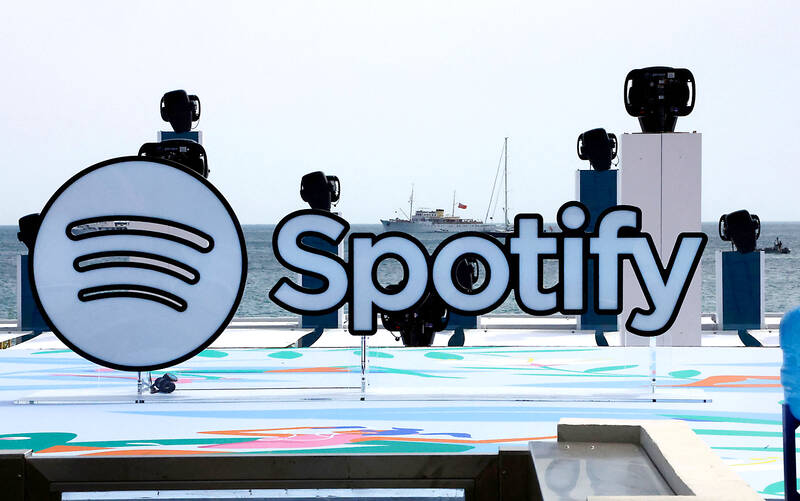There is a battle gripping the music business today around the manipulation of streaming services — and innocent indie artists are the collateral damage.
Fraudsters are flooding Spotify, Apple Music and the rest with AI-generated tracks, to try and hoover up the royalties generated by people listening to them. These tracks are cheap, quick and easy to make, with Deezer estimating in April that over 20,000 fully AI-created tracks — that’s 18 percent of new tracks — were being ingested into its platform daily, almost double the number in January. The fraudsters often then use bots, AI or humans to endlessly listen to these fake songs and generate revenue, while others are exploiting upload services to get fake songs put on real artists’ pages and siphon off royalties that way.
Spotify fines the worst offenders and says it puts “significant engineering resources and research into detecting, mitigating, and removing artificial streaming activity,” while Apple Music claims “less than 1 percent of all streams are manipulated” on its service. That may sound encouraging, but in a streaming business worth US$20.4 billion globally (according to the IFPI), it’s likely that hundreds of millions of dollars are being skimmed off annually by rogue operators.

Photo: Reuters
Part of the problem is that while the barriers of entry for musicians have been dramatically lowered — uploading songs to streaming services is much easier than manufacturing CDs or vinyl — the barriers of entry for fraudsters are lower too. So the industry has declared war, but hair-trigger automated detection systems mean that artists are seeing their music taken offline even when they’ve done nothing wrong.
Darren Owen, chief operating officer of music distribution company Fuga, suggests streaming fraud “started to blow up across the industry” around 2021. Grappling with it now makes up 50 percent of his workload.
Using AI and machine learning, Fuga gives streaming patterns a “severity score,” separating out “non-human listening patterns” to spot fraud.
“You’re not going to listen to the same song at the same time across multiple devices,” Owen says, noting that countries like India, Vietnam, Thailand and parts of eastern Europe are hotbeds of click-farm activity, using low-paid workers.
“It’s become clear that organized criminals are involved in it as well.”
It is not just services like pimpyourfollower.de in Germany — which was taken offline after a court injunction — and others in Canada and Brazil who are being targeted by record industry trade bodies for offering artificially inflated streams. Universal Music Group (UMG), the biggest record company in the world, has been accused by Drake of conspiring to increase the play count of Kendrick Lamar’s diss track Not Like Us, an allegation UMG denies.
Multiple artists say they found themselves at the sharp end of this war on manipulation, where unexpected spikes in streams get taken as proof of guilt.
Darren Hemmings is managing director of music marketing company Motive Unknown and a musician himself. His distributor recently informed him that a track on one EP, having jumped from “a few plays a day” to more than 1,000, was guilty of manipulation.
“I wouldn’t blame them for drawing that conclusion,” he says, but “it’s very judge, jury, executioner.” He did not manipulate the streams, but could not identify the root cause — other than it simply becoming popular with actual listeners.
Northern Irish rock band Final Thirteen had some of their music taken off streaming services due to a spike in the tens of thousands. They suspect this came after a play on Radio 1, but their distributor automatically concluded they were manipulated.
“It’s really hard for any artist to prove that they didn’t [manipulate streams], but it’s even harder for Spotify to prove that they did,” says their drummer, Doobes. “[They] take it down and that’s it.”
Adam J Morgan, who makes music as indie act Naked & Baked, had a track get over 10,000 streams in a week, possibly from use in a TikTok video, but it was zapped by his distributor RouteNote as suspicious.
“I hadn’t done anything wrong and they didn’t provide any evidence,” he says, believing it was down to an overly anxious RouteNote. “I spent that weekend trying to work out what was going on, but Spotify said my music hadn’t been flagged at all.”
RouteNote did not respond to a request for an interview.
Takedowns can cause musicians inconvenience, derail marketing and cost them money. Matthew Whiteside, artistic director of experimental classical event The Night With… (and head of the TNW Music label) had three different albums taken down amid claims of artificial streaming. He tracked it back: TNW Music tracks were being added to manipulated playlists.
“It made no sense [why they were added] based on the genre.”
His distributor said he could resubmit the album again, at US$40 per album, but with no guarantee it would not be removed again.
“Streaming in general is geared against the smaller and the niche,” he says. “If we get 1,000 streams a month on an album, I’d be very happy.” As such, paying to resubmit an album is beyond their release budget.
Deezer claims it was the first streaming service to implement fraud detection systems.
“We look at a lot of indicators that help our algorithm decide if a user is fraudulent or not,” says Thibault Roucou, the company’s royalties and reporting director. “When we ask for a takedown, we look manually at what’s happening and we’re very confident that it is extreme manipulation.”
Unfortunately, systems elsewhere for taking down tracks often presume guilt and the appeals system is so arduous that small acts, already struggling, just give up. Pop singer Levina, who represented Germany at Eurovision in 2017, saw her music taken off streaming services without warning — it was flagged because she unintentionally had the same name as another artist.
“With streaming services, it’s almost impossible to [appeal] through them,” she sighs. “You fill out a form but it leaves you quite powerless.”
She is also chair of the artist council within trade body Featured Artists Coalition, and they are finalizing “minimum standards for what distributors should be doing”. She proposes a traffic light warning system that allows acts time to present their defense or take action to address the problems.
Streaming services and distributors now accept this battle is about containment rather than total elimination. Owen, however, says the latest iteration is not fraudsters manipulating the streams of a few tracks by large amounts, but rather boosting multiple tracks a small amount to fly under detection radars.
For Hemmings, this could result in a two-tier streaming economy, with smaller acts abandoning the main streaming platforms, where earnings are derisory anyway, to focus on a service such as Bandcamp. “This could provoke a conclusion among large swathes of the independent music community that they’re just better off focusing on other ways to make money.”

Oct. 27 to Nov. 2 Over a breakfast of soymilk and fried dough costing less than NT$400, seven officials and engineers agreed on a NT$400 million plan — unaware that it would mark the beginning of Taiwan’s semiconductor empire. It was a cold February morning in 1974. Gathered at the unassuming shop were Economics minister Sun Yun-hsuan (孫運璿), director-general of Transportation and Communications Kao Yu-shu (高玉樹), Industrial Technology Research Institute (ITRI) president Wang Chao-chen (王兆振), Telecommunications Laboratories director Kang Pao-huang (康寶煌), Executive Yuan secretary-general Fei Hua (費驊), director-general of Telecommunications Fang Hsien-chi (方賢齊) and Radio Corporation of America (RCA) Laboratories director Pan
The consensus on the Chinese Nationalist Party (KMT) chair race is that Cheng Li-wun (鄭麗文) ran a populist, ideological back-to-basics campaign and soundly defeated former Taipei mayor Hau Lung-bin (郝龍斌), the candidate backed by the big institutional players. Cheng tapped into a wave of popular enthusiasm within the KMT, while the institutional players’ get-out-the-vote abilities fell flat, suggesting their power has weakened significantly. Yet, a closer look at the race paints a more complicated picture, raising questions about some analysts’ conclusions, including my own. TURNOUT Here is a surprising statistic: Turnout was 130,678, or 39.46 percent of the 331,145 eligible party

The classic warmth of a good old-fashioned izakaya beckons you in, all cozy nooks and dark wood finishes, as tables order a third round and waiters sling tapas-sized bites and assorted — sometimes unidentifiable — skewered meats. But there’s a romantic hush about this Ximending (西門町) hotspot, with cocktails savored, plating elegant and never rushed and daters and diners lit by candlelight and chandelier. Each chair is mismatched and the assorted tables appear to be the fanciest picks from a nearby flea market. A naked sewing mannequin stands in a dimly lit corner, adorned with antique mirrors and draped foliage

The older you get, and the more obsessed with your health, the more it feels as if life comes down to numbers: how many more years you can expect; your lean body mass; your percentage of visceral fat; how dense your bones are; how many kilos you can squat; how long you can deadhang; how often you still do it; your levels of LDL and HDL cholesterol; your resting heart rate; your overnight blood oxygen level; how quickly you can run; how many steps you do in a day; how many hours you sleep; how fast you are shrinking; how